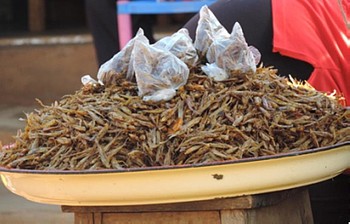EntoNUTRI
Development and implementation of insect-based products to enhance food and nutritional security in sub-Saharan Africa (EntoNUTRI)
| Duration | 01.03.2016 – 28.02.2019 |
| Budget | 1,2 m. € |
| Sponsor | Federal Ministry for Economic Cooperation and Development (BMZ) |
| Target countries | Kenya and Uganda |
The proposed 3-year project is a complementary partnership of icipe, University of Bonn, University of Hohenheim’s Food Security Centre (FSC), and national agricultural research systems (NARS) from Kenya and Uganda to enhance food and nutritional security through the use of insects as food.
The consumption of crickets (e.g. the house cricket Acheta domesticus), the longhorn grasshopper (Ruspolia differens), and a variety of saturniid caterpillars (e.g. Imbrasia zambesina and Cirina forda) is part of the food culture of some communities in Kenya and Uganda and constitutes 5–10% of protein intake of the rural and urban populace. For many households, trade in edible insects is a major source of income and considerably contributes to livelihood improvements. Recently chitin (the main component of the arthropod exoskeleton) is attracting considerable attention due to its role in enhancing immunity, promoting the growth of beneficial bacteria and inhibiting the growth and activity of pathogenic microorganisms. Furthermore, its consumption could improve the health of rural communities across Africa and beyond. Therefore the potential of the insects as a source of micronutrients, e.g. minerals like zinc and iron or vitamins, to combat hidden hunger is investigated.
Partners
- International Centre of Insect Physiology and Ecology (icipe), Nairobi, Kenya
- Center for Development Research (ZEF), University of Bonn
- Food Security Center, University of Hohenheim
- Makerere University, Uganda
- Uganda National Bureau of Standards, Uganda
- Egerton University, Kenya
- Kenyatta University, Kenya
- Kenya Bureau of Standards (KEBS), Kenya

